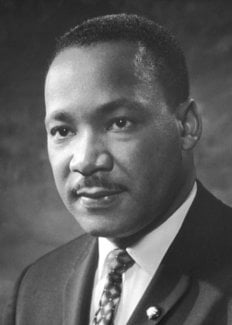
 Martin Luther King, Jr., (January 15, 1929-April 4, 1968) was born Michael Luther King, Jr., but later had his name changed to Martin. His grandfather began the family's long tenure as pastors of the Ebenezer Baptist Church in Atlanta, serving from 1914 to 1931; his father has served from then until the present, and from 1960 until his death Martin Luther acted as co-pastor. Martin Luther attended segregated public schools in Georgia, graduating from high school at the age of fifteen; he received the B. A. degree in 1948 from Morehouse College, a distinguished Negro institution of Atlanta from which both his father and grandfather had graduated. After three years of theological study at Crozer Theological Seminary in Pennsylvania where he was elected president of a predominantly white senior class, he was awarded the B.D. in 1951. With a fellowship won at Crozer, he enrolled in graduate studies at Boston University, completing his residence for the doctorate in 1953 and receiving the degree in 1955. Continue reading from The Nobel Prize
Martin Luther King, Jr., (January 15, 1929-April 4, 1968) was born Michael Luther King, Jr., but later had his name changed to Martin. His grandfather began the family's long tenure as pastors of the Ebenezer Baptist Church in Atlanta, serving from 1914 to 1931; his father has served from then until the present, and from 1960 until his death Martin Luther acted as co-pastor. Martin Luther attended segregated public schools in Georgia, graduating from high school at the age of fifteen; he received the B. A. degree in 1948 from Morehouse College, a distinguished Negro institution of Atlanta from which both his father and grandfather had graduated. After three years of theological study at Crozer Theological Seminary in Pennsylvania where he was elected president of a predominantly white senior class, he was awarded the B.D. in 1951. With a fellowship won at Crozer, he enrolled in graduate studies at Boston University, completing his residence for the doctorate in 1953 and receiving the degree in 1955. Continue reading from The Nobel Prize
The assassination of Martin Luther King, Jr., the most prominent leader of the American civil rights movement, happened on April 4, 1968 as he stood on the second floor balcony of the Lorraine Motel in Memphis, Tennessee, where he had come to lead a march by striking sanitation workers. In response to King’s death, more than 100 American inner cities exploded in rioting, looting, and violence. James Earl Ray, a career small-time criminal who became the object of a more than two-month manhunt before he was captured in England, pled guilty to the shooting and received a 99-year prison sentence. He quickly recanted his plea and spent the rest of his life claiming that he had been framed by a conspiracy that was really responsible for King’s assassination. The assassination of Martin Luther King, Jr., was one of the earthshaking events of 1968 that made it among the most tumultuous and momentous years in American history. Continue reading from Encyclopedia Britannica
It took 15 years of fighting for MLK Day to be declared a national holiday—but some states pair it with a holiday celebrating Confederate leader Robert E. Lee. On January 15, the entire nation pauses in remembrance of a civil rights hero. At least, that’s the point of Martin Luther King, Jr. Day, a federal holiday that takes place on the third Monday of each January. MLK Day was designed to honor the activist and minister assassinated in 1968, whose accomplishments have continued to inspire generations of Americans.
But though the holiday now graces the United States’ federal calendar and affects countless offices, schools, businesses and other public and private spaces, it wasn’t always observed. The fight for a holiday in Martin Luther King, Jr.’s honor was an epic struggle in and of itself—and it continues to face resistance in the form of competing holidays to leaders of the Confederacy. Continue reading from The History Channel
The Martin Luther King, Jr. Research and Education Center (Stanford University)
Findings on MLK Assassination (US National Archives)
Martin Luther King, Jr. Quotes, Assassination and Facts (History Channel)
“King-Lee Day” and Other Ways States Bend MLK’s Legacy (Vox)